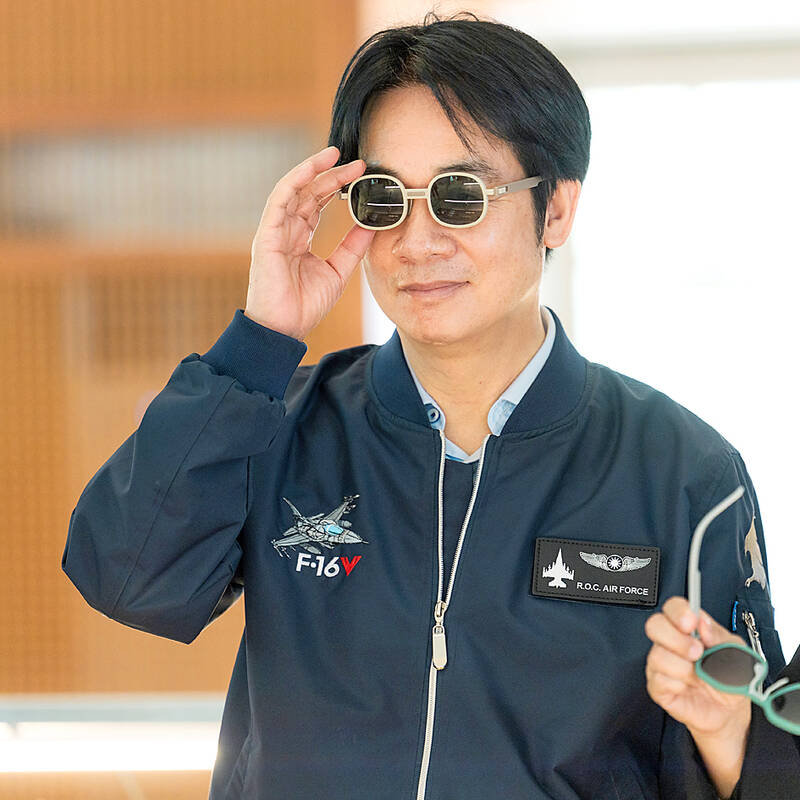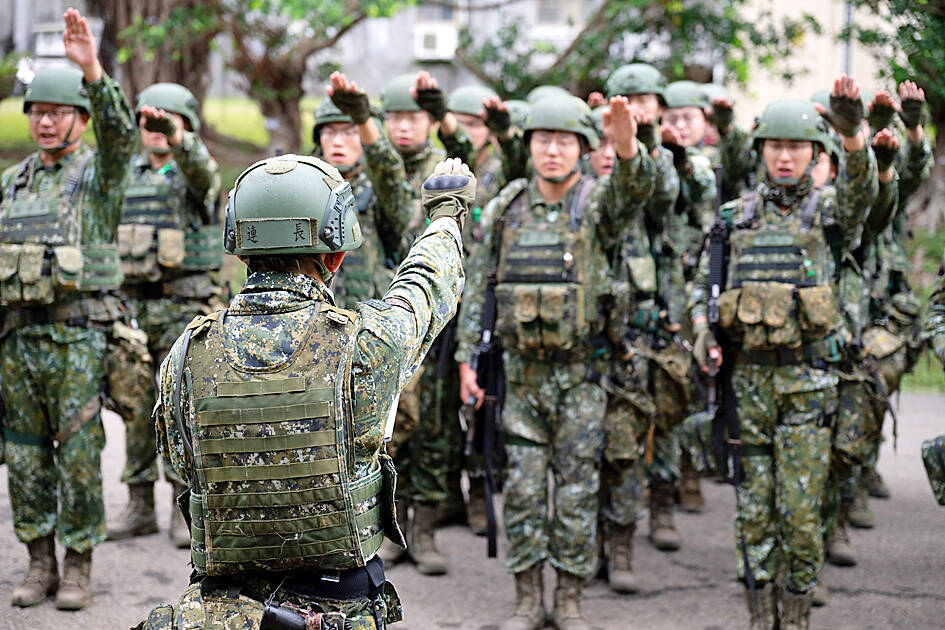President William Lai (賴清德) yesterday said his administration would unveil a special budget for investing in domestic asymmetric weapons production and supply chain resilience to counter the military threat posed by China.
Lai made the remarks in a post on Facebook commemorating the Battle of Guningtou (古寧頭戰役) in 1949, saying that the nation has endured to this day because its people came together to defend it regardless of ethnicity or political opinions.
Taiwan would honor the fallen heroes from 76 years ago by providing the strongest possible support to troops serving today, he said.

Photo: Screen grab from the Presidential Office’s Flickr page
Citing his address during this year’s Double Ten National Day celebrations, Lai said that the government remains committed to the defense policy priorities outlined in his speech, as well as to improving service members’ pay and living conditions.
The administration is working on a proposed “T-Dome,” a multi-layered air defense system with high detection and interception capabilities, to safeguard Taiwanese’s lives and properties, he said.
The armed forces are to integrate new technology in warfighting, including fielding drones in large numbers, forging a fast and flexible mobilization system, and maximizing the deterrence value of asymmetric capabilities, he said.

Photo courtesy of the Ministry of National Defense
The government is soon to propose a budget for investing in asymmetric warfare capabilities and defense resilience, to create a defense industrial base capable of independently developing and mass-producing asymmetric systems, especially drones, Lai said.
The budget bill would include provisions on public-private cooperation in indigenous research and development, production at scale and securing supply chains, he said.
Under the plan, Taiwan would establish itself as a trustworthy partner for its friends and allies in joint defense industry projects, he added.
In other news, the army yesterday began its Lu Sheng 1 (陸勝, “Land Victory”) exercise, during which two combined-arms brigades would engage in simulated combat for seven days.
The drills are part of a military-wide drive to improve joint warfare capabilities, decentralize command and control, and train troops under realistic conditions, the Army Command Headquarters said.
Commanders taking part in the exercise have been instructed to sharpen the fighting skills of their units while keeping enemy capabilities in mind at all times, it added.
Lu Shen 1 focuses on participants’ proficiency in newly introduced tactics and equipment — including drones, and command and control systems — managing logistics, and fighting in cities, among other core competencies, the army said.
Additional reporting by Fang Wei-li

The combined effect of the monsoon, the outer rim of Typhoon Fengshen and a low-pressure system is expected to bring significant rainfall this week to various parts of the nation, the Central Weather Administration (CWA) said. The heaviest rain is expected to occur today and tomorrow, with torrential rain expected in Keelung’s north coast, Yilan and the mountainous regions of Taipei and New Taipei City, the CWA said. Rivers could rise rapidly, and residents should stay away from riverbanks and avoid going to the mountains or engaging in water activities, it said. Scattered showers are expected today in central and

People can preregister to receive their NT$10,000 (US$325) cash distributed from the central government on Nov. 5 after President William Lai (賴清德) yesterday signed the Special Budget for Strengthening Economic, Social and National Security Resilience, the Executive Yuan told a news conference last night. The special budget, passed by the Legislative Yuan on Friday last week with a cash handout budget of NT$236 billion, was officially submitted to the Executive Yuan and the Presidential Office yesterday afternoon. People can register through the official Web site at https://10000.gov.tw to have the funds deposited into their bank accounts, withdraw the funds at automated teller

COOPERATION: Taiwan is aligning closely with US strategic objectives on various matters, including China’s rare earths restrictions, the Ministry of Foreign Affairs said Taiwan could deal with China’s tightened export controls on rare earth metals by turning to “urban mining,” a researcher said yesterday. Rare earth metals, which are used in semiconductors and other electronic components, could be recovered from industrial or electronic waste to reduce reliance on imports, National Cheng Kung University Department of Resources Engineering professor Lee Cheng-han (李政翰) said. Despite their name, rare earth elements are not actually rare — their abundance in the Earth’s crust is relatively high, but they are dispersed, making extraction and refining energy-intensive and environmentally damaging, he said, adding that many countries have opted to

PEACE AND STABILITY: Maintaining the cross-strait ‘status quo’ has long been the government’s position, the Ministry of Foreign Affairs said Taiwan is committed to maintaining the cross-strait “status quo” and seeks no escalation of tensions, the Ministry of Foreign Affairs (MOFA) said yesterday, rebutting a Time magazine opinion piece that described President William Lai (賴清德) as a “reckless leader.” The article, titled “The US Must Beware of Taiwan’s Reckless Leader,” was written by Lyle Goldstein, director of the Asia Program at the Washington-based Defense Priorities think tank. Goldstein wrote that Taiwan is “the world’s most dangerous flashpoint” amid ongoing conflicts in the Middle East and Russia’s invasion of Ukraine. He said that the situation in the Taiwan Strait has become less stable